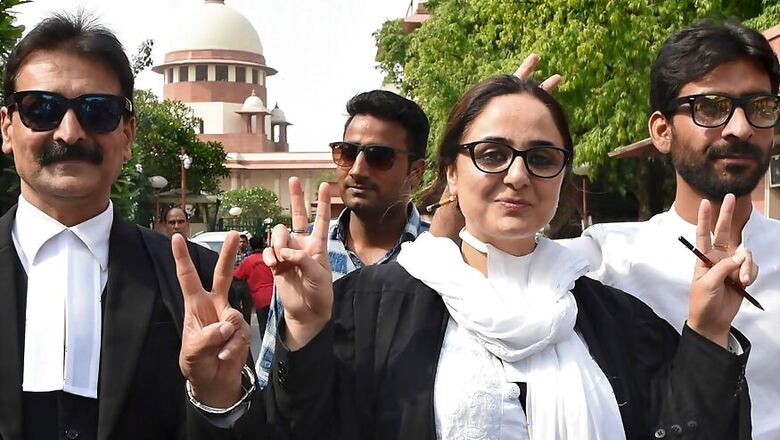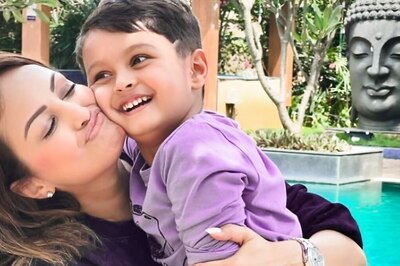
views
Lawyer Deepika Singh Rajawat remained the face of the Kathua gang-rape and murder trial even though the victim’s family sacked her in November last year, alleging she had appeared for just two out of hundreds of hearings in the special court in Pathankot.
Rajawat, who gained international acclaim and awards for taking up the case of the eight-year-old victim, was among the lawyers who reached the special court in Pathankot early morning for the verdict. One reason for the laurels she was showered with was the constant stream of abusive messages and threats, of rape and murder, she had faced while arguing the case.
In a special conversation with News18, Rajawat had talked about the threats she faced while she was representing the family.
Every time she stepped into her house, Rajawat told News18, she double-checked the main gate as she feared for the safety of her own daughter, her husband and herself.
This heightened 24x7 alertness had become a part of her life ever since she took up the gang-rape and murder case, she said. State police had provided her with security after she expressed threat to her life.
“I feel threatened that my family or I might be harmed physically. Also, I feel attempts will be made to damage my dignity,” she had told News18 in October last year while she was still the prosecution lawyer. She feared that one day a narcotic substance could be planted at her house to malign her reputation.
Back in a trial court in Jammu, Rajawat encountered constant stares and pin-drop silences as she passed through crowds of lawyers, police and petitioners. Behind her people would whisper. Some would point at her murmuring that “she is the woman who appears on television and newspapers”, others would recall Rajawat from the widely shared photograph of her walking out of the Supreme Court, flanked by her colleagues.
She had just attended another hearing in the ongoing trial against the eight men who have been accused of gang-raping and murdering the Kathua girl with a motive of 'driving out Bakarwals from Jammu', when News18 spoke to her.
The crime was followed by a protest march in support of the perpetrators, part of which were even Rajawat’s lawyer colleagues. The lawyers in Jammu also tried to stop the Crime Branch police from filing charges against the accused before chief judicial magistrate's office in Kathua.
After Supreme Court refused the demand for a CBI inquiry in the case, the case was transferred to a fast-track court in Pathankot, Punjab.
As soon as she became the face of the aggrieving parents in the quest for justice, Rajawat started receiving abuses and threats, apart from being trolled on social media. She was labeled an “anti-national” and suffered a boycott by her colleagues, relatives and neighbours.
“Serious allegations have been leveled on me ever since I took the case. My life has changed completely,” Rajawat said at the Jammu court. She said she volunteered to fight the case as soon as she read the details of the incident in newspapers.
“I volunteered to take up their case after coming to know the horrific details of the crime. Though it goes against my profession to approach someone, I felt I must help the family get justice,” she said.
“I am a woman, a mother, a lawyer and an activist. These reasons are enough to fight this case. More than that I am a responsible citizen who can differentiate between good and bad,” she said, clarifying that she was fighting the case pro-bono.
Mother of a six-year-old girl, Rajawat was born in a Kashmiri Pandit family which migrated to Jammu in 1986 from north Kashmir’s Kupwara.
After graduating in law from the University of Jammu, she became a journalist and was active in the profession for five years.
In 2008, she began working for a child rights group in Delhi and worked as a human rights activist for seven years, before moving back to Jammu where she started practicing as a lawyer.
She never thought she will be mentally harassed for fighting for justice of the girl. The events, which unfolded after the case came into limelight, put pressure on her and her family.
“At one point in time, my husband was furious about it when he saw people calling me an anti-national. Even my parents and brother told me that I should not put myself in danger,” said Rajawat, who received the Vogue Woman of the Year 2018 award for taking up the case.
The campaign against her was so relentless, she said, that her neighbours stopped talking with her parents.
“People started distancing themselves from my parents and my family. I was called a traitor and anti-national just because I was fighting the case of a Muslim girl,” she said.
Her parents and family were upset with her but she had made up her mind not to abandon the eight-year-old’s family.
“I told my parents that they can disown me if they feel insulted,” she said, adding, “but I made it clear to them that I am not going to leave the case.”
She felt proud and said the situation had made her stronger and wiser.
“Their abusing cannot weaken me, it gives me strength and keeps me motivated always,” she said. “Even my daughter is learning from it. When she sees her mother working for a Muslim child, I think she gains a sense that we need to believe in humanity first.”
Rajawat’s relations with her colleagues also soured. “At court, most people don’t talk to me even today. They feel I am their enemy,” she said.
But she had later begun to gain support of her colleagues. “Now I feel there are fewer people who hate me. People from my own community now even appreciate me. Some of my colleagues in Jammu have also begun supporting me.”



















Comments
0 comment